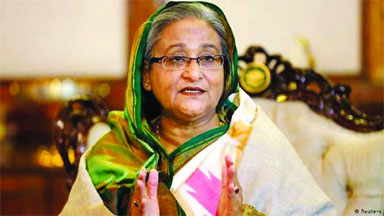Patna (TIP)- India is unlikely to respond to Bangladesh’s request to extradite former premier Shiekh Hasina, people familiar with the matter said, pointing out that Dhaka has not completed key formalities needed to take forward such an issue. The extradition request was made in the form of a note verbale, or unsigned diplomatic correspondence, sent by the Bangladesh high commission in New Delhi to the external affairs ministry on December 23. The move came amid unprecedented strain in bilateral ties since the formation of Bangladesh’s interim government led by Nobel laureate Muhammad Yunus.
A note verbale is among the lowest levels of diplomatic exchanges, and not typically used for matters as sensitive as extradition requests, the people said on condition of anonymity.
Hasina, 77, has been in India since she stepped down in the face of nationwide protests led by student groups and fled Dhaka. Yunus and other leaders of the caretaker administration have pointed to Hasina’s presence in India and her comments while in exile, describing them as a source of tension.
The extradition demand is being seen in some quarters in New Delhi as “public posturing” by Bangladesh’s interim government to satisfy domestic constituencies, especially student groups that have gained in influence and are clamouring for the former premier to be brought back to the country, the people cited above said.
“Extradition is not some simple process and both parties making and receiving such a request have certain obligations. The person who is the subject of an extradition request also has options. Those options are yet to be exercised,” one of the people said.
The people noted that the person whose extradition has been sought has the right to mount a legal challenge and this option has not been taken up.
Besides, the India-Bangladesh extradition treaty of 2013 includes provisions under which an extradition request can be turned down. Article 6 of the treaty, or the “Political Offence Exception”, states extradition “may be refused if the offence of which it is requested is an offence of a political character”.
Article 8, which lists grounds for refusing extradition, states a person may not be extradited if an accusation is not “made in good faith in the interests of justice”.
MEA spokesperson Randhir Jaiswal had on December 23 confirmed that the Indian side received a note verbale from the Bangladeshi side in connection with the extradition request, but declined to comment further.
The people also pointed out that the Indian side had highlighted the way forward in bilateral relations during foreign secretary Vikram Misri’s visit to Dhaka last month.
An official statement issued at the end of Misri’s day-long visit on December 9 said that he highlighted India’s “willingness to build a positive and constructive relationship” with Bangladesh based on mutual trust and mutual sensitivity to each other’s concerns. While extending India’s support for a democratic, stable and inclusive Bangladesh, Misri told his interlocutors that bilateral engagements in areas such as connectivity, trade and energy were “geared towards the benefit of the people of Bangladesh”.
While India continues to have concerns about the targeting of Hindus and other minorities in Bangladesh, there have been signs that the power centres in Dhaka could be softening their approach towards India. Hasina’s presence in India and Bangladesh’s extradition request didn’t figure in an extensive interview of Bangladesh Army chief Gen Waker-Uz-Zaman published by a leading Bengali newspaper on Wednesday.
Zaman said Bangladesh is dependent in many ways on India, an “important neighbour”, and will not do anything that goes against New Delhi’s strategic interests. India has an interest in Bangladesh’s stability and the two sides share a give-and-take relationship that “must be based on fairness”, he said. Bangladesh’s de facto foreign minister Touhid Hossain also spoke on Wednesday about the need to balance the extradition request and other issues. “This [extradition] is one of the issues and the two countries have many bilateral issues… We will advance with all these issues side by side,” he told reporters in response to a question on the possible impact of India turning down the extradition request.
Source: HT
India unlikely to respond to Hasina extradition call
